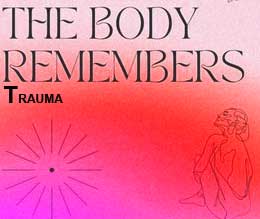Any incident you have passed in childhood, young or mature. It may remain in your mind and heart, even its impacts on your body. No matter whether you have recovered from the trauma, scratches stay in your heart, as how your body remembers trauma!
A young, innocent girl gets deceived by a young man. She was just 18, innocent; nothing knew about the cruelty of human nature. How deep of pain she felt with her teary eyes in awakening deep night. It was her first face deceiving from a human source. But the benefit of this is that she undergoes the tracking of spirituality. Think about the nature of the world and humans. And the reason for coming into this world. Someone can ignore this deceiving and enter the face of a new chapter of life. But the sensitive and hearty girl couldn’t bear this; even she couldn’t bear this. Hence, she innovated a new chapter of the world and life after diving into spirituality. She felt strong as much as she didn’t care about the surrounding people’s thoughts. She does that. That is good for her.
Yes, it is the rule of spending life. But, the matter here: Are trauma’s effects removed from her mind and body?

At some stages of life, she felt darkness and remembered the memories. But its intensity is as low as the potent techniques of meditation and spirituality.
Yes, these techniques lower the trauma memories. But be remembered during the journeys of meditation and spirituality, in some stages, trauma memories become interface and cause deep heart pain. It affects your body and brain.
How your body remembers trauma and causes hormonal changes:
Where are trauma memories stored, or the body remembers trauma? They remember through the nervous system and brain.
When an individual faces trauma, the brain releases stress hormones like cortisol and adrenaline. These hormones get the body up to either fight or run from the threat.
Long-term effect against powerful trauma:
The stress response can become dysregulated if the traumatic experience is too powerful or lasts too long. It can cause long-term health and emotional issues.
The brain part involved in trauma:
The amygdala,
The amygdala is a part of the brain that processes emotions and fear. It is one of the ways that the body retains memories of trauma.
People who have experienced trauma have a hyperactive amygdala, which increases their propensity for startled reactions, anxiety, and terror.
How the nervous system affects trauma:
The nerve system is another mechanism by which the body retains trauma.
The nervous system manages heart rate, Respiration, and digestion.
When someone is through trauma, their nervous response alerts the mechanism in terms of trauma. This responsibility involves several physical changes:
- Headache
- Stomach disturbances
- Muscle tension
- Brain and body communication are also affected by trauma.
- The people experiencing trauma have difficulty maintaining their emotions.
- There are more likely chances to share flashbacks and memories.
Time is the great healer:
Yes, it is true; time is the greatest healer of any trauma, but painful memories with deep pinching pain remain inside the heart. This is how trauma affects a person’s cardiac and emotional health.
The symptoms of trauma may vary from individual to individual. Some people experience the post-traumatic disorder, and some experience fewer symptoms.
Signs your body is releasing trauma:
Your body remembers trauma through three main processes. They involve:
Physically sign:
Physically symptoms involve:
- tense muscles,
- weariness,
- difficulty sleeping,
- soreness, and
- Changes in appetite or stomach disturbances.
Psychological signs:
Include difficulties in:
- focusing,
- anxiety,
- depression,
- irritability,
- flashbacks
- nightmares
Behavioural signs include :
- substance addiction,
- self-destructive behavior, and
- Avoiding triggers for the trauma.
How to release trauma from the body:
Trauma is released from the body through the following techniques;
- Consult to therapist
- Join support system
- Avoiding stimuli of trauma
- Self-caring
- Meditation
- Yoga
- Aerobic exercise
- Writing and being involved in making art or creativity.

Where are repressed memories stored:
Repressed memories are kept in the same areas of the brain as other memories in the amygdala, prefrontal cortex, and hippocampus. Conscious access to them is challenging.
It is due to the brain’s built-in defense system, which shields us from the intense emotions connected to traumatic memories.
The brain may also prevent us from accessing these memories to spare us from the suffering and anxiety they bring.
Where is childhood trauma stored in the body?
Although repressed memories are kept in the same areas of the brain as other memories, conscious access to them is challenging. It is due to the brain’s built-in defense system, which shields us from the intense emotions connected to traumatic memories.
The brain may also prevent us from accessing these memories to spare us from the suffering and anxiety they bring. They may also cause:
- Stress hormone dysregulation
- Chronic pain
- Psychosomatic changes
- Neurological changes
- Immune system dysregulation
Frequently Ask A Question:
Where are traumatic memories stored in the brain?
Traumatic memories stored in:
- Almond shape amygdala
- Prefrontal cortex
- Hippocampus
Although, the amygdala is the central part that is involved in the storage and responses of memories.
How to remove body memory?
Time is the most fabulous healer; your painful memories fade over time.
Sometimes, therapy needs to remove trauma. Sometimes techniques used such as:
- Exercise
- New seeking hobbies and innovations.
- To remove trauma,
- It is necessary to keep the patient
- Be kind yourself
- Identify your triggers
- And then groom yourself.
Why am I suddenly remembering my childhood trauma?
Significant life changes, like getting married, having kids, or losing a loved one, might bring back traumatic memories.
Stress: Stress has the power to bring back painful memories. This is because stress can lead your body and mind on high alert, increasing your susceptibility to flashbacks and other PTSD symptoms.
Additional terrible events: Another traumatic event in your life may trigger recollections of your terrible childhood experience.
Therapy: It is typical to begin recalling new facts or experiencing more vivid flashbacks when processing your childhood trauma.
How to release emotional trauma from the body?
- Meditation
- Yoga
- Therapy ( cognitive-behavioral therapy (CBT), exposure therapy, or Somatic Experiencing (SE).
- Listen to your body.
Releasing trauma from body exercises like walking, dancing, jogging, yoga, and meditation is crucial. It is
Conclusion:
It is true that your body remembers trauma, but the important thing is how to release trauma from the nervous system. It is released through meditation, exercise, yoga, and different therapies, such as somatic therapy and Eye Movement Desensitization and Reprocessing (EMDR), which adaptively change these memories.
The majority of people face different terrible incident in their life; the main thing is the duration of life, how short it is, when and how anyone can go to the next world and leaves this world glittering and beauties. So enjoy the rest of your life.
Give life importance as it has it’s worth.




Leave a Reply